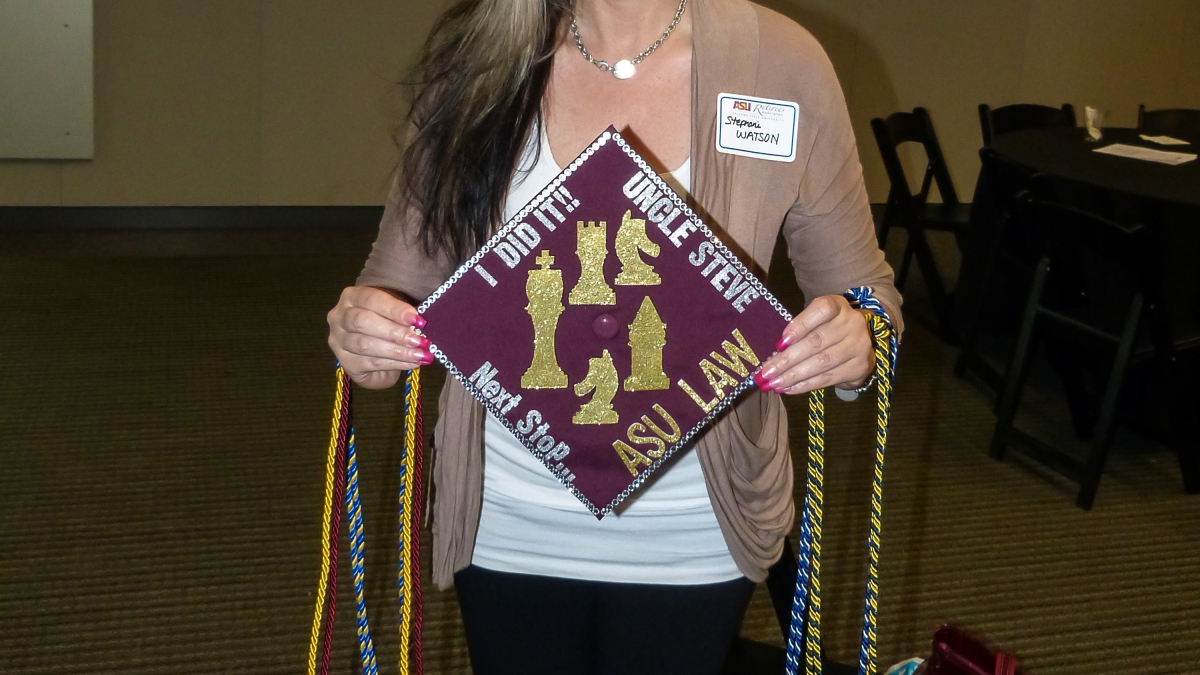Dual bachelor’s graduate finds success through ASU Online

Stephani Watson is graduating from ASU with a BS in political science and a BA in interdisciplinary studies.
Editor’s note: This is part of a series of profiles for spring 2018 commencement.
Born to teenage parents and raised by a single mother in Northern California, Stephani Watson learned to support herself from the time she was 17 years old.
At 22, she was hired by Intel. She spent nearly two decades there, gaining knowledge and promotions. But then the recession hit.
At the time, Watson was nearly 40 years old, earning six figures.
“After the recession hit, they were only hiring people that had multiple degrees: master’s degrees, PhDs. On paper — even though my work was good — I couldn’t compete with any of my peers.”
Unable to compete, Watson was terminated and soon found herself in a predicament.
“Where am I going to go get a job that makes that much money, with no degrees, and when my entire adult work experience is with one company? It was devastating,” she said.
She spent a couple of years working on web development for clients but knew she had to go back school, calling it a “no-brainer.” Her first stop was a local community college where she studied interdisciplinary studies, political science and sociology. Her next stop was Arizona State University.
Watson is graduating this May with a Bachelor of Science in political science and a Bachelor of Arts in interdisciplinary studies, with two areas of concentration in justice studies and sociology. But her time with and love for the university won’t end after graduation.
“I can’t express how much I love ASU and hope to have a long future relationship with ASU. Once I get into my career and start earning an income, I want to set up pledges for all the scholarships I was blessed to have,” she said. During her time at ASU, Watson said she received support from the Choctaw Nation of Oklahoma Higher Education Program Scholarship, William D. Kavan Political Science Scholarship, ASU Retirees Association Scholarship, and the American Indian Graduate Center.
Watson answered a few questions about her experience at ASU and her plans for the future.
Question: Why did you choose ASU?
Answer: When I was looking to transfer, I wanted to apply the degrees I had earned at community college, which were interdisciplinary studies, political science and sociology. Unfortunately, our CSU college is more geared toward business and they didn’t have the well-rounded programs that I wanted. I had heard a lot of great things about ASU so I went online, looked at the programs and — because it was online — it was very appealing to me. I started contacting the admissions department; everyone was extremely nice and helpful.
Q: How was your experience as a non-traditional, online student?
A: Going back to school for me was exciting, maybe because I am a non-traditional student and already had a corporate background. I had already worked several years in the workforce and recognized how important a post-secondary degree was. I was really able to dedicate and apply myself so that portion of it wasn’t difficult.
Q: What was your “aha” moment, when you realized you wanted to study the field you majored in?
A: I think my “aha” moment happened actually not at ASU but right before I transferred. I was attending on-campus classes at my community college with a lot of students that were half my age and they were always coming to me. I would have thought because I was older they would treat me funny or ignore me, but it was the complete opposite. The students were super nice and always wanted to be on my team and always coming to me for advice. I thought, “Wow, if I can help students I would love to do this and teach.” And once I transitioned into ASU, my professors were so phenomenal that I just knew I wanted to be a part of that.
Q: What’s the best piece of advice you’d give to those still in school or considering returning?
A: Really dedicate yourself and don’t settle for mediocre work or mediocre grades. Your grades, your transcripts and how you do at school is like your credit. You have to keep your credit clean so you can buy things. School is like that as well: You have to make sure it’s top-notch so you get the best employment options after you leave school, to be able to do whatever it is you’re truly passionate about.
Q: What are your plans after graduation?
A: My plans are immediately ASU Law, I’m already registered and start Aug. 16. From there, I’d like to get a professorship at Folsom Lake College; I just finished an internship there and my previous professors want me to come back to teach. My stretch goal is doing the EdD through ASU Online for my doctorate.
Q: If someone gave you $40 million to solve one problem on our planet, what would you tackle?
A: I would try and tackle the problem of education. I think a lot of world problems stem from people being uneducated, and that creates a wealth of other problems because they don’t know how to vote; they start making decisions for the greater population because they just don’t know better. Whereas if you’re educated, you can create solutions.
More University news

ASU on the cusp of becoming a $1B research university
Once a fledgling research school, Arizona State University soon will hit $1 billion in annual research funding, placing the…
ASU tops $900 million in research expenditures
For the past decade, Arizona State University has been climbing the ranks as one of fastest-growing research universities in the…

ASU names 3 Regents Professors for 2025
Three Arizona State University professors are being honored with the highest faculty award possible — Regents Professor.The three…